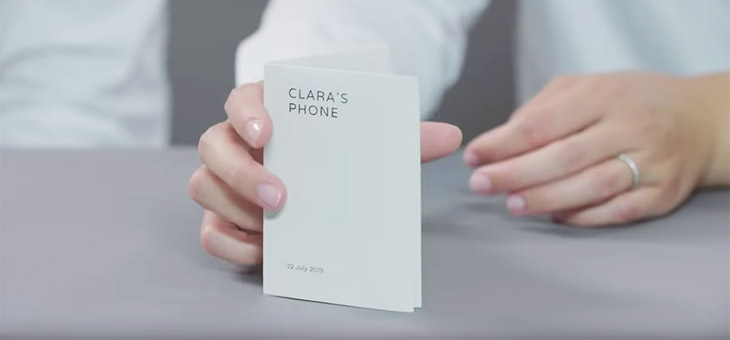Recent updates to Apple and Android operating systems have also focused on reducing your phone use, such as apps to help track and rein in your phone usage, or minimise the harmful effects of digital technology.
Extensive studies have proven that excessive phone use has a negative psychological effect, causing anxiety, depression, and mental health issues.
Any product that harms people is eventually exposed and falls by the wayside.
It seems Google has this in mind with its latest innovation: a printable phone that you can use to replace your Android – even if only for one day.
The latest in a series of wellness tools, ‘Paper Phone’ is part of Google’s Digital Wellbeing Experiments, this one designed by London design studio Special Projects.
Paper Phone initially requires the use of an Android app. Once installed, it allows you to choose and print all the information you might want available offline, such as contacts, maps, weather, even screenshots. Once printed, simply fold it up, and you have a Paper Phone.
“The whole premise should be absolutely insufferable. Instead, it’s a surprisingly convincing demonstration of how well the information we all feel that we need our phone to access can so easily be decoupled from the addiction-device,” reports Fast Company author Mark Wilson.
You could print out your essential contacts, a couple of crossword puzzles, the week’s weather report, or maybe a map of the city or directions to an address or event. There’s even a way to keep using your phone for cashless payments: simply cut out the slots to hold your credit card with PayPass chip.
But wait, there’s more: Google is releasing more facets of the Digital Wellbeing Experiments, such as Unlock Clock which counts the times you’ve opened your phone in a day, or Post Box, which compiles your push notifications and sends them all at once rather than continually distracting you throughout the day.
Then there’s Desert Island, which turns off everything but your most essential apps and allows you to sort of switch off for a day.
Google hopes the project will provide a “collection of ideas and tools that help people find a better balance with technology”.
It also hopes other developers will get on board and contribute their own experiments.
“We hope these experiments inspire developers and designers to consider digital wellbeing in everything they design and make.
“The more people that get involved the more we can all learn about building better technology for everyone.”
What do you think of these projects? Do you spend too much on your phone? Or do you know someone who does? Why not share this page with them?
If you enjoy our content, don’t keep it to yourself. Share our free eNews with your friends and encourage them to sign up.
Related articles:
Google plans to kill the password
Google’s in-ear translator
Is Google scanning your emails?

